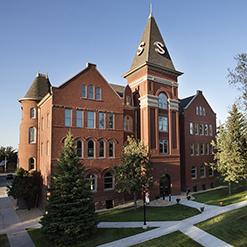
The North Dakota State College of Science (NDSCS) is gearing up for its comprehensive accreditation review by the Higher Learning Commission (HLC), scheduled for April 14-15, 2025. This process is crucial, as accreditation ensures that educational institutions meet established standards of quality and effectiveness, thereby maintaining public trust and enabling students to access federal financial aid.
NDSCS's accreditation journey began in 1971, with reaffirmations in subsequent decades. In 2002, the college adopted the Academic Quality Improvement Program (AQIP), an accreditation model emphasizing quality and continuous improvement. Following the phasing out of AQIP in 2019, NDSCS transitioned to the Open Pathway for accreditation. This ten-year cycle focuses on quality assurance and institutional improvement, incorporating a Quality Initiative Project (QIP) tailored to the institution's needs.
NDSCS's current QIP is the "Partnering for Success" project. The objectives for this project included assessing the current state of partnerships at the college, increasing business and industry collaborations by 3% from 2022 which totaled approximately $6.5 million, establishing and expanding partnerships across all areas of the college, and developing training activities to enhance partnership development. The results from this college-wide project were a huge success. Based on a comparison of partnership reporting between fiscal year 2022 and fiscal year 2023, there was an increase of over 200 partnerships. 288 partnerships were reported in 2022 with 496 reported for 2023. This 70% increase demonstrated that there truly was a significant opportunity to grow partnerships at the college.
The upcoming HLC review will evaluate NDSCS based on five criteria.
1. Mission – The institution’s mission is clear and guides its operations.
2. Integrity: Ethical and Responsible Conduct – The institution acts ethically and responsibly.
3. Teaching and Learning: Quality, Resources, and Support – The institution provides quality education, sufficient resources, and support for students and faculty.
4. Teaching and Learning: Evaluation and Improvement – The institution assesses and improves its educational effectiveness.
5. Institutional Effectiveness, Resources, and Planning – The institution engages in systematic planning and uses its resources effectively.
To document its compliance with these criteria, the college has submitted a written report called The Assurance Argument to the Higher Learning Commission (HLC) which is a key component of the Accreditation Process.
This 35,000-word document includes a detailed narrative of how the institution meets each of HLC’s five criteria. It also includes evidence files, which are supporting documents (policies, reports, meeting minutes, assessment data) that substantiate the claims made in the narrative. This document is submitted through HLC’s online Assurance System and reviewed by a peer review team. The Assurance Argument can be viewed on the college’s website at NDSCS.edu/reaccreditation.
NDSCS must also submit a Federal Compliance Filing as part of their comprehensive evaluation materials, demonstrating compliance with specific regulations set by the U.S. Department of Education.
Accreditation not only assures the public of an institution's commitment to quality education but also facilitates the transfer of credits among institutions and signals to prospective employers that graduates have met widely accepted educational standards. As NDSCS approaches its April 2025 review, the institution continues to enhance its educational offerings and processes, aiming to meet and exceed the HLC's standards.